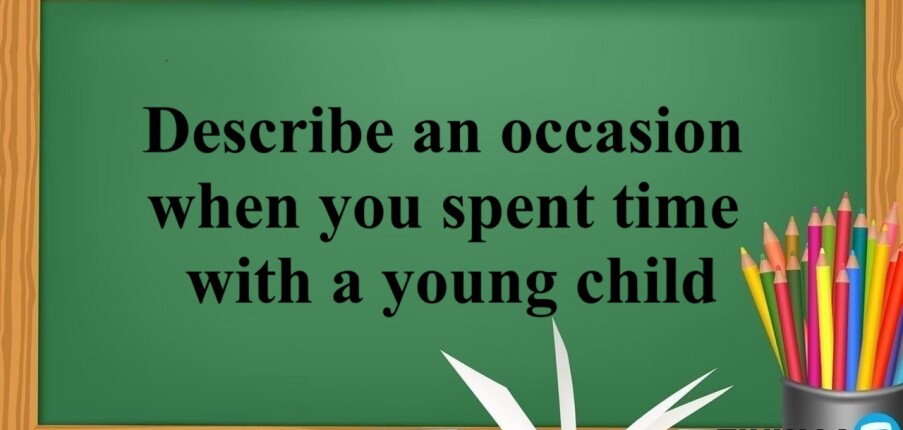Describe an occasion when you spent time with a young child | Bài mẫu Speaking Part 2, 3
Bài mẫu IELTS Speaking Part 2
Cue Card:
Describe an occasion when you spent time with a young child
You should say:
- Who this child was
- When you spent time with this child
- What you did together
And how you felt about it.
1. Bài mẫu 1:
One memorable occasion when I spent time with a young child was during a family gathering last summer. My cousin's three-year-old daughter, Ly, was the center of attention that day. As soon as I arrived, Ly's eyes lit up with excitement, and she reached out her tiny hand, eager to explore the world around her.
I decided to take her to a nearby park where we could enjoy some quality time together. As we strolled hand in hand, I couldn't help but marvel at her curiosity and boundless energy. We played on the swings, went down the slides, and even had a mini picnic on a cozy blanket under a shady tree. Watching her giggles and contagious laughter filled me with joy.
During our time together, I realized how much patience and creativity were required when engaging with a young child. I would make up stories, sing nursery rhymes, and encourage her to express herself through drawing and painting. We shared snacks and engaged in imaginative play, pretending to be characters from her favorite cartoon.
Interacting with Ly reminded me of the simplicity and innocence of childhood. Her pure and unfiltered perspective on the world around her was refreshing. It was a truly heartwarming experience, and I cherished every moment we spent together, creating a beautiful bond that I will always treasure.
Từ vựng cần lưu ý:
- eager (adj): háo hức
- stroll (v): đi dạo
- marvel (v): lấy làm ngạc nhiên
- curiousity (n): sự tò mò
- boundless (adj): vô hạn
- giggle (v): cười khúc khích
- contagious (adj): dễ lan tỏa
- make sth up (phrasal verb): bịa ra
- rhyme (n): vần điệu
- simplicity (n): sự giản dị
- innocence (n): sự ngây thơ
- unfiltered (adj): ngây thơ
- heartwarming (adj): cảm động
Bài dịch:
Một dịp đáng nhớ khi tôi dành thời gian với một đứa trẻ là trong một buổi họp mặt gia đình vào mùa hè năm ngoái. Ly, đứa con gái ba tuổi của anh họ tôi, là tâm điểm của sự chú ý ngày hôm đó. Vừa đến nơi, mắt Ly sáng lên thích thú, em chìa bàn tay nhỏ xíu ra, háo hức khám phá thế giới xung quanh.
Tôi quyết định đưa em ấy đến một công viên gần đó, nơi chúng tôi có thể tận hưởng khoảng thời gian vui vẻ bên nhau. Khi chúng tôi tay trong tay đi dạo, tôi không khỏi ngạc nhiên trước sự tò mò và nghị lực vô hạn của em ấy. Chúng tôi chơi xích đu, trượt cầu trượt và thậm chí còn tổ chức một buổi dã ngoại nhỏ trên chiếc khăn ấm cúng dưới gốc cây râm mát. Nhìn tiếng cười khúc khích và tiếng cười lan tỏa của em ấy khiến tôi tràn ngập niềm vui.
Trong thời gian chúng tôi chơi cùng nhau, tôi nhận ra rằng cần phải có bao nhiêu sự kiên nhẫn và sáng tạo khi tương tác với trẻ nhỏ. Tôi sẽ bịa ra những câu chuyện, hát những bài đồng dao và khuyến khích em thể hiện bản thân thông qua vẽ hay tô màu. Chúng tôi chia sẻ đồ ăn nhẹ và tham gia vào trò chơi tưởng tượng, giả làm nhân vật trong phim hoạt hình yêu thích của em ấy.
Tiếp xúc với Ly khiến tôi nhớ lại sự giản dị và hồn nhiên của tuổi thơ. Góc nhìn trong sáng và ngây thơ của em ấy về thế giới xung quanh thật mới mẻ. Đó là một trải nghiệm thực sự ấm lòng và tôi trân trọng từng khoảnh khắc chúng tôi ở bên nhau, tạo nên một mối quan hệ đẹp đẽ mà tôi sẽ luôn trân trọng.
2. Bài mẫu 2:
Last weekend, I went back to my hometown because I had some days off and spent all my time with my niece. Her parents were out all day, so I was responsible for looking after her.
Her nickname is Sue, and she is six years old, and this was the first time I had to babysit for such a small kid. Actually, I didn't have to do too much because she has mastered some self care skills like brushing her teeth and washing her face. I was so grateful that she could finish her meals on her own, as I am not good at feeding children.
We spent all day on leisure activities like watching TV and reading books. I gave her 30 minutes to watch TV and only let her watch programs for kids. But the thing was, after 30 minutes she didn't turn off the TV and burst into tears. I was lost for words; then I had to make a deal with her, which went like this: if she obeyed my rule, I would take her to the supermarket and buy her one item that she liked. Luckily, she stopped crying and started reading books obediently.
After that, we also spent 1 hour finishing her homework so she could get off to a good start with her new week. In the evening, I took her to the supermarket as I promised. I struggled to track her as she was too energetic to stroll by my side; she just ran around to find her favorite item. After we got home, her parents also picked her up. To be honest, that was a tiring day, but I was happy because I could strengthen our aunt-and-niece relationship.
Một số từ vựng ăn điểm được sử dụng trong bài mẫu Describe an occasion when you spent time with a young child IELTS Speaking Part 2:
- Responsible for sth/Ving sth: chịu trách nhiệm với ai/việc gì/làm việc gì
- Babysit (verb): trông trẻ em
- Self-care skill (noun): kỹ năng tự chăm sóc bản thân
- Burst into tears: bật khóc
- Lost for words: không biết nói sao
- Make a deal: giao kèo
- Get off to a good start: khởi đầu thuận lợi
- Stroll (verb): đi dạo
- Strengthen (verb): tăng cường
- Aunt-and-niece relationship: mối quan hệ giữa dì và cháu
3. Bài mẫu 3:
I'd like to share a story about a time when I spent time with a child. It was during the summer of last year, when I volunteered at a local summer camp for underprivileged children. One of the children I spent time with was a young boy named Jacob.
Jacob was a shy and reserved child, and I could tell that he was a bit nervous around the other children. He was also very quiet and didn't speak much. However, I could see that he had a lot of potential and I wanted to help him come out of his shell.
During our time together, we did a lot of fun activities, like playing games, going on nature walks, and doing arts and crafts. I remember one day we made paper airplanes and had a competition to see whose airplane could fly the farthest. Jacob's airplane didn't go very far, but he was still happy and proud of his creation.
As the days went by, I could see Jacob becoming more comfortable around the other children. He started to open up and talk more, and he even started to initiate conversations with me. We also started to bond over our shared love of drawing, and we spent an afternoon drawing pictures together.
By the end of the summer camp, I felt a real connection with Jacob. He had come out of his shell and had become more confident and outgoing. I felt proud of the role I had played in helping him achieve this growth.
Reflecting on this experience, I felt a sense of fulfillment and joy. Spending time with Jacob had reminded me of the importance of connecting with others, especially children who may need some extra support and encouragement. It also reminded me of the value of volunteering and giving back to the community.
Từ vựng cần lưu ý
- Underprivileged children (trẻ em thiếu may mắn): Những trẻ em không được hưởng những điều kiện, lợi ích tương tự như những người khác trong xã hội.
- Reserved (kín đáo, ít nói): Người có tính cách kín đáo, ít nói và thường giữ cho mình.
- Come out of his shell (thoát ra khỏi cái vỏ bọc): Thay đổi và trở nên tự tin và thoải mái hơn trong việc tương tác xã hội.
- Going on nature walks (đi dạo trong thiên nhiên): Đi bộ hoặc tham gia các hoạt động ngoài trời trong môi trường thiên nhiên.
- Crafts (nghệ thuật thủ công): Các hoạt động sáng tạo và thủ công, như vẽ, gấp giấy, hoặc làm đồ handmade.
- The farthest (xa nhất): Xa nhất so với những cái khác.
- Open up (mở lòng): Mở lòng, chia sẻ, trở nên thân thiện và chân thành hơn trong giao tiếp.
- Initiate conversations with (khởi xướng cuộc trò chuyện với): Bắt đầu cuộc trò chuyện hoặc mở đầu cho một cuộc trò chuyện.
- Bond over (kết nối với nhau qua): Tạo mối liên kết, gắn kết với người khác thông qua sự chung sở thích, quan điểm hoặc trải nghiệm.
- Outgoing (hướng ngoại, thân thiện): Người hoạt bát, thích giao tiếp và dễ dàng tiếp xúc với người khác.
- Reflect on (suy ngẫm về): Suy nghĩ, nhìn lại và rút ra kết luận về một trải nghiệm hoặc sự kiện.
- A sense of fulfillment (cảm giác hài lòng, hoàn thành): Một cảm giác thoả mãn và hạnh phúc khi hoàn thành một công việc hoặc mục tiêu.
- Encouragement (sự khuyến khích): Hành động hoặc lời nói để truyền động lực, khích lệ hoặc động viên người khác.
- Giving back to the community (đóng góp lại cho cộng đồng): Thực hiện các hoạt động tình nguyện hoặc hỗ trợ cộng đồng để trả lại những lợi ích và giúp đỡ xã hội.
Bài mẫu IELTS Speaking Part 3
1. Do you think children should have a lot of toys?
Bạn có nghĩ trẻ em nên có nhiều đồ chơi không?
Bài mẫu:
“No, I don't believe children should have a lot of toys. While toys can provide entertainment and educational value, an excess of toys can hinder a child's creativity and imagination. It is important for children to engage in diverse activities, play outdoors, and interact with others. Limited toys encourage resourcefulness and the development of social skills, promoting a well-rounded and balanced upbringing.”
Từ vựng:
- excess (n): quá nhiều
- resourcefulness (n): khả năng tự quyết định
- well-rounded (adj): toàn diện
- upbringing (n): sự nuôi dưỡng, dạy dỗ
Bài dịch:
Không, tôi không tin trẻ em nên có nhiều đồ chơi. Mặc dù đồ chơi có thể mang lại giá trị giải trí và giáo dục, nhưng quá nhiều đồ chơi có thể cản trở khả năng sáng tạo và trí tưởng tượng của trẻ. Điều quan trọng là trẻ em phải tham gia vào các hoạt động đa dạng, vui chơi ngoài trời và tương tác với những người khác. Sở hữu ít đồ chơi sẽ khuyến khích sự tháo vát và phát triển các kỹ năng xã hội, thúc đẩy sự giáo dục toàn diện và cân bằng.
2. Where do children usually play?
Trẻ em thường chơi ở đâu?
Bài mẫu:
“Children typically play in various settings, including playgrounds, parks, and recreational areas. These spaces provide opportunities for physical activity, social interaction, and imaginative play. Additionally, children may engage in play within their homes, using toys, games, and creative activities. The specific location depends on factors such as accessibility, safety, and availability of play equipment. It is crucial for children to have access to play environments that stimulate their development and allow for exploration and fun.”
Từ vựng:
- recreational (adj): giải trí
- social interaction: tương tác xã hội
- imaginative (adj): sáng tạo
- crucial (adj): quan trọng
- stimulate (v): kích thích
Bài dịch:
Trẻ em thường chơi ở nhiều nơi khác nhau, bao gồm sân chơi, công viên và khu vực giải trí. Những không gian này tạo cơ hội cho hoạt động thể chất, tương tác xã hội và vui chơi giàu trí tưởng tượng. Ngoài ra, trẻ em có thể tham gia vui chơi trong nhà, sử dụng món đồ chơi, trò chơi hay các hoạt động sáng tạo. Vị trí cụ thể còn phụ thuộc vào các yếu tố như khả năng tiếp cận, sự an toàn hay sự sẵn có của các thiết bị vui chơi. Điều quan trọng là trẻ em cần được tiếp cận với các môi trường vui chơi kích thích sự phát triển của chúng và có cơ hội được khám phá và vui chơi.
3. Do you think there are too many rules for children to follow, whether at school or at home?
Bạn có nghĩ rằng có quá nhiều quy tắc bắt trẻ phải tuân theo, dù ở trường hay ở nhà không?
Bài mẫu:
“Yes, I believe there can be an excess of rules for children to follow, both at school and at home. While rules provide structure and guidance, an excessive number can stifle a child's creativity and independence. It is important to strike a balance between necessary rules for safety and discipline, and allowing children the freedom to explore and learn from their own experiences. A reasonable set of rules helps children develop responsibility and decision-making skills, while an overwhelming amount can hinder their personal growth.”
Từ vựng:
- stifle (v): kìm hãm
- strike (v): đạt được
- discipline (n): sự kỷ luật
- reasonable (adj): hợp lý
- hinder (v): cản trở
Bài dịch:
Đúng vậy, tôi tin rằng có thể có quá nhiều quy tắc mà trẻ em phải tuân theo cả ở trường và ở nhà. Mặc dù các quy tắc cung cấp các cấu trúc và hướng dẫn, nhưng quá nhiều quy tắc có thể kìm hãm sự sáng tạo và độc lập của trẻ. Điều quan trọng là phải đạt được sự cân bằng giữa các quy tắc cần thiết về an toàn và kỷ luật, đồng thời cho phép trẻ tự do khám phá và học hỏi từ kinh nghiệm của chính mình. Một bộ quy tắc hợp lý giúp trẻ phát triển trách nhiệm và kỹ năng ra quyết định, trong khi một số lượng quá lớn có thể cản trở sự phát triển cá nhân của chúng.
4. Do you think children should follow all the rules?
Bạn có nghĩ rằng trẻ em nên tuân theo tất cả các quy tắc không?
Bài mẫu:
“While it's important for children to learn about rules and their significance, it's equally crucial to foster their sense of autonomy and critical thinking. Strict adherence to every rule may stifle creativity and hinder their ability to make independent decisions. Encouraging a balanced approach, where children understand the rationale behind rules and learn to make responsible choices, can empower them to develop into well-rounded individuals capable of navigating various situations effectively.”
Từ vựng:
- autonomy (n): sự tự chủ
- adherence (n): tuân thủ
- stifle (v): kìm hãm
- hinder (v): cản trở
- rationale (n): cơ sở lý luận
- empower (v): trao quyền
Bài dịch:
Mặc dù việc cho trẻ học về các quy tắc và tầm quan trọng của chúng là rất quan trọng, nhưng việc thúc đẩy ý thức tự chủ và tư duy phản biện của trẻ cũng quan trọng không kém. Việc tuân thủ nghiêm ngặt mọi quy tắc có thể kìm hãm sự sáng tạo và cản trở khả năng đưa ra quyết định độc lập của chúng. Khuyến khích cách tiếp cận cân bằng, trong đó trẻ em hiểu lý do đằng sau các quy tắc và học cách đưa ra những lựa chọn có trách nhiệm, có thể giúp chúng phát triển thành những cá nhân toàn diện có khả năng xử lý các tình huống khác nhau một cách hiệu quả.
5. Do you think it's necessary for parents to make decisions for their children?
Bạn có nghĩ rằng việc cha mẹ đưa ra quyết định cho con cái của họ là cần thiết không?
Bài mẫu:
“Yes, to some extent, parents should make decisions for their children. As caregivers, they possess valuable life experience and knowledge that can guide children in making appropriate choices. However, it is also important for parents to foster independence and allow children to make decisions within certain boundaries. Balancing parental guidance with encouraging autonomy helps children develop decision-making skills, learn from their mistakes, and build self-confidence.”
Từ vựng:
- valuable (adj): quý giá
- foster (v): thúc đẩy
- boundary (n): ranh giới
- self-confidence (n): sự tự tin
Bài dịch:
Có, ở một mức độ nào đó, cha mẹ nên đưa ra quyết định cho con cái của họ. Là người chăm sóc, họ có kinh nghiệm sống và kiến thức quý giá có thể hướng dẫn trẻ đưa ra những lựa chọn phù hợp. Tuy nhiên, điều quan trọng là cha mẹ phải nuôi dưỡng tính độc lập và cho phép trẻ đưa ra quyết định trong những giới hạn nhất định. Cân bằng sự hướng dẫn của cha mẹ với việc khuyến khích quyền tự chủ giúp trẻ phát triển kỹ năng ra quyết định, học hỏi từ những sai lầm của mình và xây dựng sự tự tin.
6. Do you think it is good for parents to help their children choose friends?
Việc cha mẹ giúp con cái chọn bạn có tốt không?
Bài mẫu:
“While some parental guidance is beneficial, it is important for children to have autonomy in choosing their friends. Parents can provide advice, teach them about positive qualities in friendships, and help identify red flags. However, imposing strict control can hinder a child's social development and ability to make independent decisions. Encouraging open communication and trust between parents and children is crucial, as it allows for guidance while respecting the child's need to explore and develop their own friendships.”
Từ vựng:
- autonomy (n): quyền tự chủ
- red flag: dấu hiệu xấu
- impose (v): áp đặt
- hinder (v): cản trở
Bài dịch:
Mặc dù một số chỉ dẫn của cha mẹ là có ích, nhưng điều quan trọng là trẻ phải có quyền tự chủ trong việc lựa chọn bạn bè. Cha mẹ có thể đưa ra lời khuyên, dạy chúng về những phẩm chất tích cực trong tình bạn và giúp xác định các dấu hiệu xấu. Tuy nhiên, việc áp đặt sự kiểm soát chặt chẽ có thể cản trở việc phát triển xã hội và khả năng đưa ra quyết định độc lập của trẻ. Khuyến khích giao tiếp cởi mở và có sự tin tưởng giữa cha mẹ và con cái là rất quan trọng, vì nó cho phép cha mẹ hướng dẫn đồng thời tôn trọng nhu cầu khám phá và phát triển tình bạn của trẻ.
Lời kết
Hy vọng rằng bài mẫu của 1900 về chủ đề “Describe an occasion when you spent time with a young child” trong đề thi IELTS Speaking đã cho các bạn cách trả lời câu hỏi sao cho đạt được band điểm mong ước.
Nếu có thắc mắc, hãy để lại bình luận và 1900 sẽ giải đáp nhé!
Xem thêm các tài liệu Tiếng Anh hay, chi tiết khác:
TOP Việc làm "HOT" dành cho sinh viên:




